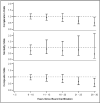Observations on Surgeons' Case Selection, Morbidity, and Mortality Following Board Certification
- PMID: 26372308
- PMCID: PMC4747674
- DOI: 10.1097/SLA.0000000000001361
Observations on Surgeons' Case Selection, Morbidity, and Mortality Following Board Certification
Abstract
Objective: The purpose of this study is to determine if patient selection varies based on years of surgical practice.
Background: The impact of hospital and surgeon volume as a marker of experience has demonstrated an inverse association with surgical outcomes. However, temporal measures of experience often demonstrate no effect. Additionally, a self-reporting survey demonstrated decreasing case complexity over time, suggesting that changes in patient selection may account for some of these observed discrepancies.
Methods: General surgery cases at a single tertiary care center reported to the American College of Surgeons National Surgical Quality Improvement Program over a 10-year period were identified. Additionally general surgery cases from the ACS NSQIP 2008 PUF data were used to create risk models for any complications, 30-day mortality, or a composite complication or mortality outcome. These models then estimated risk for our local data. Years of experience after American Board of Surgery certification were calculated for each surgeon for each case. Multivariate linear regression, controlling for surgeon clustering, was used to determine the association between years of surgical experience and preoperative risk of complications and mortality.
Results: Eighteen thousand six hundred and eighty eight cases were identified from our institution. Surgeons selected patients of increasing operative risk until 15 years of practice before selecting lower risk patients throughout the rest of their career. After adjusting for risk, no association was observed between years from board certification and mortality. However, there was a trend toward decreasing complication rates with increasing experience.
Conclusions: Surgical experience significantly impacts patient selection. Surgeons with over 25 years of experience had lower complication rates. Experience had no impact on mortality.
Figures


Similar articles
-
Identification of surgical complications and deaths: an assessment of the traditional surgical morbidity and mortality conference compared with the American College of Surgeons-National Surgical Quality Improvement Program.J Am Coll Surg. 2006 Nov;203(5):618-24. doi: 10.1016/j.jamcollsurg.2006.07.010. Epub 2006 Sep 27. J Am Coll Surg. 2006. PMID: 17084322
-
Career phase of board-certified general surgeons: workload composition and outcomes.Arch Surg. 2011 Nov;146(11):1307-13. doi: 10.1001/archsurg.2011.265. Arch Surg. 2011. PMID: 22106324
-
Association of hospital participation in a surgical outcomes monitoring program with inpatient complications and mortality.JAMA. 2015 Feb 3;313(5):505-11. doi: 10.1001/jama.2015.90. JAMA. 2015. PMID: 25647206
-
Systematic review and narrative synthesis of surgeons' perception of postoperative outcomes and risk.BJS Open. 2020 Feb;4(1):16-26. doi: 10.1002/bjs5.50233. Epub 2019 Nov 26. BJS Open. 2020. PMID: 32011813 Free PMC article.
-
Development of an annually updated Japanese national clinical database for chest surgery in 2014.Gen Thorac Cardiovasc Surg. 2016 Oct;64(10):569-76. doi: 10.1007/s11748-016-0697-1. Epub 2016 Aug 8. Gen Thorac Cardiovasc Surg. 2016. PMID: 27501695 Free PMC article. Review.
Cited by
-
Trends in the Outcomes of Advanced Hepatobiliary-Pancreatic Surgery: The Impact of a Nationwide Clinical Database and Surgeon Certification System.J Hepatobiliary Pancreat Sci. 2025 Aug;32(8):565-577. doi: 10.1002/jhbp.12158. Epub 2025 May 13. J Hepatobiliary Pancreat Sci. 2025. PMID: 40364607 Free PMC article.
References
-
- Birkmeyer JD, Stukel TA, Siewers AE, et al. Surgeon volume and operative mortality in the United States. N Engl J Med. 2003;349:2117–27. - PubMed
-
- Cowan JA, Jr., Dimick JB, Leveque JC, et al. The impact of provider volume on mortality after intracranial tumor resection. Neurosurgery. 2003;52:48–53. discussion 53-4. - PubMed
-
- Cowan JA, Jr., Dimick JB, Thompson BG, et al. Surgeon volume as an indicator of outcomes after carotid endarterectomy: an effect independent of specialty practice and hospital volume. J Am Coll Surg. 2002;195:814–21. - PubMed
-
- Chen K, Cheung K, Sosa JA. Surgeon volume trumps specialty: outcomes from 3596 pediatric cholecystectomies. J Pediatr Surg. 2012;47:673–80. - PubMed
-
- Lapar DJ, Mery CM, Kozower BD, et al. The effect of surgeon volume on mortality for off-pump coronary artery bypass grafting. J Thorac Cardiovasc Surg. 2012;143:854–63. - PubMed
Publication types
MeSH terms
Grants and funding
LinkOut - more resources
Full Text Sources
Other Literature Sources
Medical
Molecular Biology Databases

